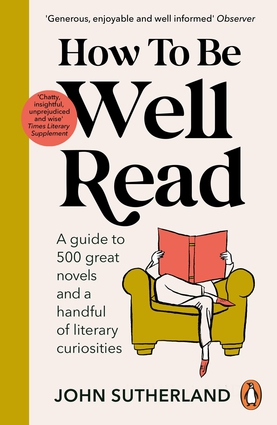Overview
A guide to the best novels ever written, and why they matter
In the course of over 500 wittily informative pieces, John Sutherland gives us his own take on the most rewarding, most remarkable and, on occasion, most shamelessly enjoyable works of fiction ever written. It is the perfect reading list for every literary aficionado. An appreciation of Apuleius#&39;s The Golden Ass - arguably the first-ever novel - is followed by a consideration of Ian Fleming#&39;s Goldfinger. The Handmaid#&39;s Tale is followed by Hangover Square, Jane Eyre by Jaws. There are imposing Victorian novels, entertaining contemporary thrillers and everything in between, from dystopian works to romance.
The flavor of each is brilliantly evoked and its merits or downfalls assessed. At the same time, Sutherland shows how the work fits into a broader context - whether that of the author#&39;s life or of other books from the same genre or period. And he offers endless snippets of intriguing information: did you know, for example, that the Nazis banned Bambi or that William Faulkner wrote As I Lay Dying on an upturned wheelbarrow; that Voltaire completed Candide in three days, or that Anna Sewell was paid £20 for Black Beauty?
Both encyclopedic and entertaining, this is a wonderful dip-in book, whose opinions will inform and, on occasion, infuriate.Reviews
"A dazzling array of genres, periods, styles and tastes... chatty, insightful, unprejudiced (but not uncritical) and wise.#&39; —Times Literary Supplement
"Generous, enjoyable and well informed.#&39; Observer
#&39;Anyone hooked on fiction should be warned: this book will feed your addiction.#&39; Mail on Sunday
#&39;500 expertly potted plots and personal comments on a wide range of pop and proper prose fiction.#&39; The Times
"Part of the attraction of most classic novels is their strong sense of place... [Literary Landscapes] delves into the geography, location, and terrain of 50 beloved books - from Joyce#&39;s Dublin to Harper Lee#&39;s Monroeville, Ala."#&8213;New York Times Book Review, #&39;New & Noteworthy#&39; on Literary Landscapes
"This fascinating (and beautifully designed) book looks at how novels#&39; settings impact their plot, character, and tone."#&8213;Refinery29 on Literary Landscapes
"The loving treatment by an expert . . . will please both novices and established readers looking to dip back into well-loved works."—Shelf Awareness on A Little History of Literature
"A genial, enthusiastic guide leads a jaunt through literary history. . . . [Sutherland’s] aim is not to draw a line between high art and low, but to share his prodigious joy of reading."—Kirkus Reviews on A Little History of LiteratureAuthor Biography
John Sutherland is Lord Northcliffe Professor Emeritus of Modern English Literature at University College London and previously taught at the California Institute of Technology. He writes regularly for the Guardian, the Times and the New York Times, and is the author of many books including Curiosities of Literature, Is Henry V a War Criminal? (with Cedric Watts), biographies of Walter Scott, Stephen Spender and the Victorian elephant Jumbo, and The Boy Who Loved Books, a memoir.

